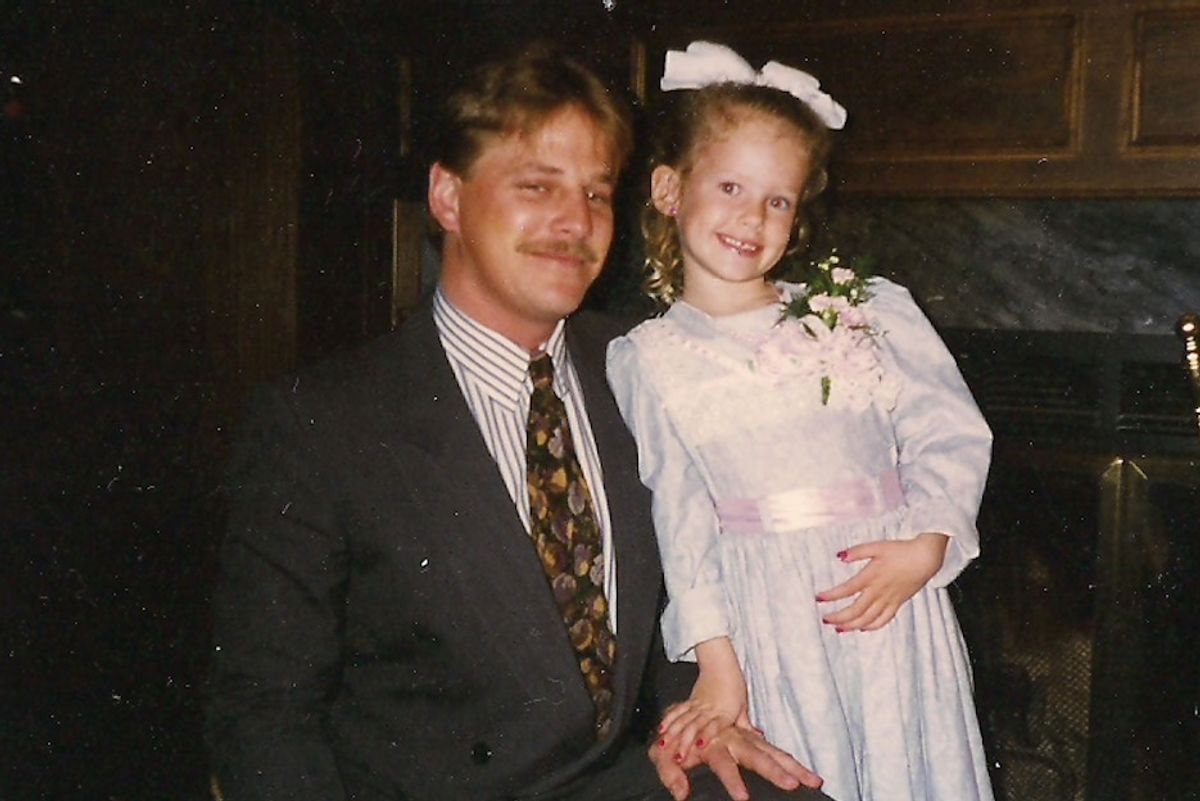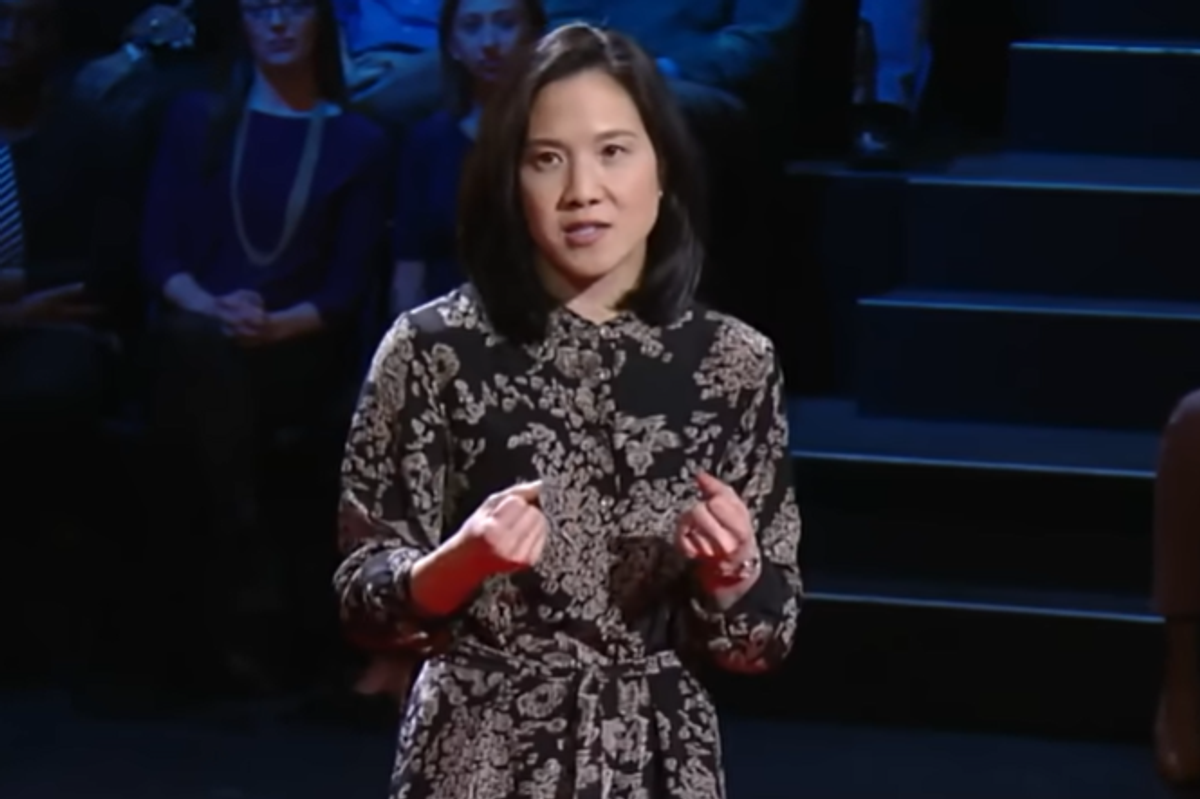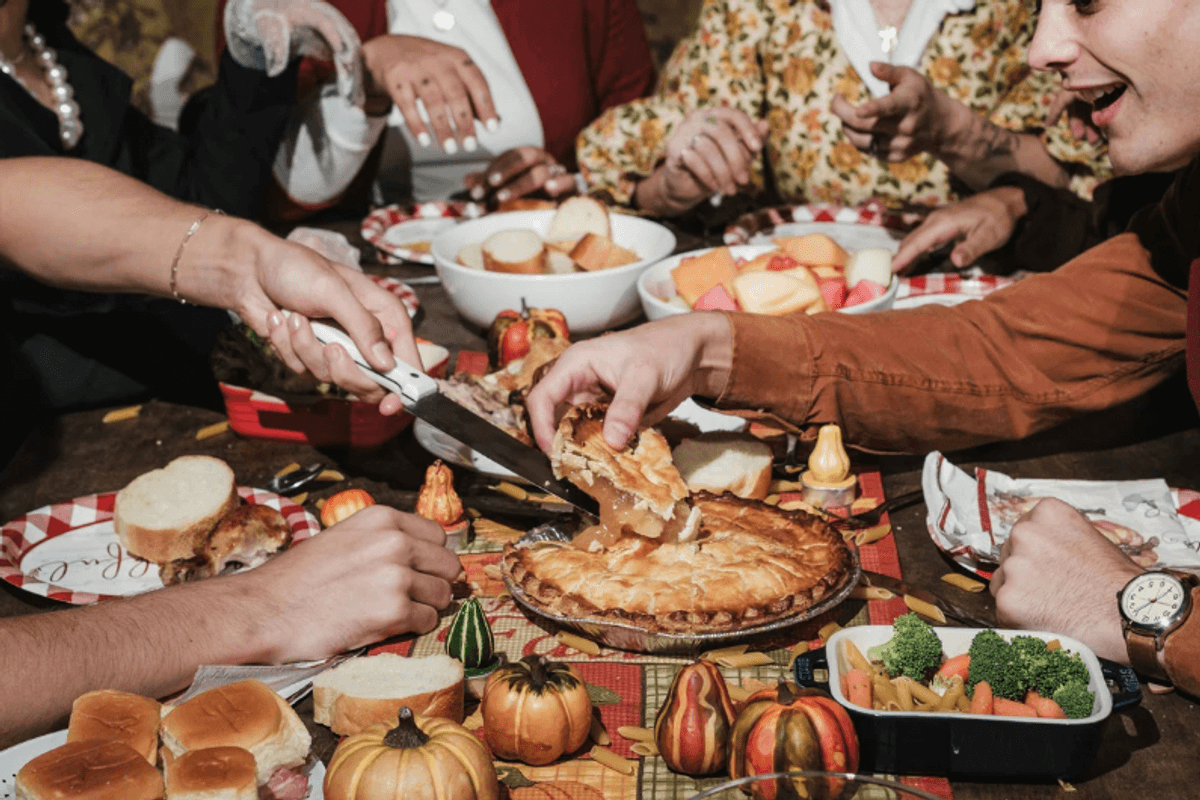What to do when you're the child of an alcoholic
My dad was an addict, and growing up with him taught me a lot.

Ashley Tieperman and her father.
There was never just one moment in my family when we “found out" that my dad was an addict.
I think I always knew, but I never saw him actually drinking. Usually, he downed a fifth of vodka before he came home from work or hid tiny bottles in the garage and bathroom cabinets.
My name is Ashley, and I am the child of an addict. As a kid, I cried when our family dinner reservation shrunk from four to three after a man with glassy eyes stumbled through the door. I didn't guzzle the vodka, but I felt the heartbreak of missed birthdays. I feel like I should weigh 500 pounds from all the “I'm sorry" chocolate donuts. I had to grow up quicker, but it made me into the person I am today.

Me and my dad.
Photo with permission from writer Ashley Tieperman.
I spent many years shouting into journals about why this was happening to me. But this is the thing that no one will tell you about loving someone who has an addiction: it will force you to see the world through different eyes.
Here are some things I've learned:
1. When your family's yelling about burnt toast, they're probably also yelling about something else.
My family yelled about everything — and nothing — to avoid the messy stuff. We all handled my dad's addiction differently. My brother devoured sports. My mom took bubble baths. I slammed doors and slammed boyfriends for not understanding my family's secrets.
Regardless of the preferred coping mechanism, everyone feels pain differently.
2. Your "knight in shining armor" can't fix this.
Boyfriends became my great escape when I was young. But when I expected them to rescue me from the pain I grew up with, it never worked out. No matter how strapping they looked galloping in on those white horses, they couldn't save me or fix anything.
In the end, I realized that I had to find healing on my own before I could build a strong relationship.
3. “Don't tell anyone" is a normal phase.
When my dad punched holes in the wall, my mom covered them up with artwork. I wanted to rip the artwork down to expose all the holes, especially as a bratty teenager. But eventually I realized that it wasn't my choice. My parents had bills to pay and jobs to keep. I've learned it's common to cover up for dysfunction in your family, especially when it feels like the world expects perfection.
4. Friends probably won't get it, but you'll need them anyway.
Bulldozed by broken promises, I remember collapsing on a friend's couch from the crippling pain of unmet expectations. I hyperventilated. Things felt uncontrollable and hopeless. My friend rubbed my back and just listened.
These are the kinds of friends I will keep forever, the ones who crawled down into the dark places with me and didn't make me get back up until I was ready.
5. You can't fix addiction, but you can help.
When I was a teenager, I called a family meeting. I started by playing a Switchfoot song: “This is your life. Are you who you want to be?"
Let's skip to the punchline: It didn't work.
It wasn't just me. Nothing anyone did worked. My dad had to lose a lot — mostly himself — before he hit that place they call “rock bottom." And, in all honesty, I hate that label because “rock bottom" isn't just a one-and-done kind of place.
What can you do while you wait for someone to actually want to get help? Sometimes, you just wait. And you hope. And you pray. And you love. And you mostly just wait.
6. Recovery is awkward.
When a counselor gave me scripted lines to follow if my dad relapsed, I wanted to shred those “1-2-3 easy steps" into a million pieces.
For me, there was nothing easy about my dad's recovery. My whole family had to learn steps to a new dance when my dad went into recovery. The healing dance felt like shuffling and awkwardly stepping on toes. It was uncomfortable; new words, like trust and respect, take time to sink in. And that awkwardness is also OK.
7. I still can't talk about addiction in the past tense.
Nothing about an addict's life happens linearly. I learned that early on. My dad cycled through 12-step programs again and again, to the point where I just wanted to hurl whenever anyone tried to talk about it. And then we finally reached a point where it felt like recovery stuck.
But even now, I'll never say, “My dad used to deal with addiction." My whole family continues to wrestle with the highs and lows of life with an addict every single day.
8. Happy hours and wedding receptions aren't easy to attend.
My family will also probably never clink glasses of red wine or stock the fridge full of beer. I'm convinced happy hours and wedding receptions will get easier, but they might not. People get offended when my dad orders a Diet Coke instead of their fine whisky.
Plus, there's the paranoia factor. Surrounded by flowing liquor, I hate watching my dad crawl out of his skin, tempted to look “normal" and tackle small talk with people we barely know. I've learned that this fear will probably last for a while, and it's because I care.
9. If you close your eyes, the world doesn't just “get prettier."
With constant fear of the unknown, sometimes our world is not a pretty place. I remember watching the breaking news on 9/11 and feeling the terror of the planes crashing into the Twin Towers as if I was there.
My dad numbed the anxiety of these dark days with vodka, but this didn't paint a prettier world for him when he woke up the next day. I've dealt with the fear of the unknown with the help of boys, booze, and bad dancing on pool tables. Life hurts for everyone, and I think we all have to decide how we're going to handle the darkness.
10. Rip off the sign on your back that reads: “KICK ME. MY LIFE SUCKS."
Sometimes I look in the mirror and I see only my broken journey. In some twisted way, I'm comforted by the dysfunction because it's kept me company for so long. It's easy to let the shadow of my family's past follow me around and choose to drown in the darkness.
But every day, I'm learning to turn on the light. I have to write the next chapter in my recovery story, but I can't climb that mountain with all this crap weighing me down.
11. It's OK to forgive, too.
Some people have given me sucky advice about how I should write an anthem on daddy bashing, or how to hit the delete button on the things that shaped my story.
Instead, my dad and I are both learning to celebrate the little things, like the day that he could change my flat tire. On that day, I didn't have to wonder if he was too drunk to come help me.
I can't forget all the dark nights of my childhood.
But I've learned that for my own well-being, I can't harbor bitterness until I explode.
Instead, I can love my dad, day by day, and learn to trust in the New Dad — the one with clearer eyes and a full heart. The one who rescues me when I call.
This article was written by Ashley Tieperman and originally appeared on 04.27.16
- Rob Lowe, celebrating 31 years of sobriety, offers hope to other recovering addicts ›
- Cristiano Ronaldo tells people to drink water 'not Coca-Cola' at a ... ›
- Mom 'kidnaps' her baby to scare lazy dad - Upworthy ›
- When the holidays turn you back into a teenager - Upworthy ›
- Every school kid has a water bottle these days - Upworthy ›
- Blake Kasemeier's explains of the poverty mindset - Upworthy ›
- To the men I love, about men who scare me. - Upworthy ›
- Mom explains why she's fine with her daughter stealing vodka - Upworthy ›
- Woman has fool-proof response to the question, ‘Can I buy you a drink?’ - Upworthy ›
- LGBTQ troops kicked out of military get honorable discharges - Upworthy ›
- What happens after drinking 1, 2, and 3 glasses of wine? - Upworthy ›
- Mom has the 'my bad' hack to stop screaming at kids - Upworthy ›
- Viral stories of people helping strangers pay for groceries are inspiring other acts of kindness - Upworthy ›






 Dirty dishes left on a tableCanva
Dirty dishes left on a tableCanva Gif of overwhelmed waitress via
Gif of overwhelmed waitress via 